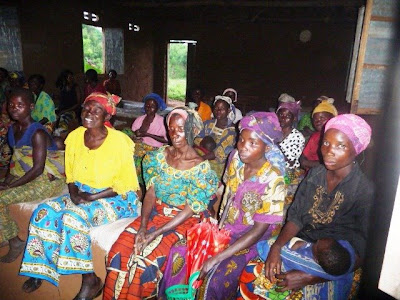
Kamanyola and outlying fields.
Kamanyola lies on the west bank of the Ruzzi River, directly across the river from Rwanda. Because of its strategic location, Kamanyola has endured much conflict during the past 12 years, initially after the Rwandan genocide when the Interahamwe (Hutus) fled across the river and settled in the hills surrounding Kamanyola, then later when Tutsi forces under General Mutebishi invaded on the pretext of hunting them down. This area is rich in agricultural and mineral resources, which unfortunately makes it a target of military forces supported by the Rwandan government.
I am traveling again with Honorable David Mubalama, a Senator elected fby the Province of South Kivu, where Kamanyola is located. We are here, because it is said that atrocities against women are worse in Kamanyola than elsewhere in Congo, and they continue to occur daily. It is estimated that 60% of women in this area have been brutally gang raped, with cruelty greater than in other areas.

Dr. Amie stands in front of his hospital with patients and staff.
Our first stop is St. Norbert's, a small, general hospital supported solely by its founder and principal physician, Dr. Amie. The hospital serves the poor and is in need of many things, from medicines to an X-ray machine. So far it has been unable to attract grant money, yet it continues to survive by the will and hard work of its founder.
 Women with newborns in maternity ward at St. Norbert's Hospital.
Women with newborns in maternity ward at St. Norbert's Hospital.
Our next stop is a women's collective with over 500 members: some survivors of sexual, gender-based violence (SGBV), others widows, and many "vulnerables", who are women with children and no means of support. Senator Mubalama is hoping I can generate microloans for these needy women.






No comments:
Post a Comment